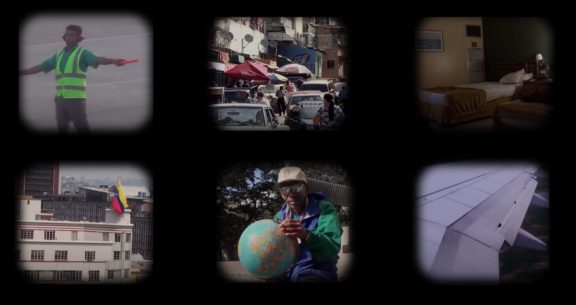
The separation from loved ones, the alienation of living somewhere else and the multiple effects of massive migration in our society are growing as the themes of Venezuelan artists’ songs and movies.
By Caracas Chronicles – Ernesto Rodríguez
Aug 26, 2021
“Sí, sí me iría, me iría demasiado.” That phrase was a bomb. It was also one of the first memes coming purely out of Venezuelan online culture. It became part of one generation’s lexicon after a college documentary titled “Caracas, ciudad de despedidas” went viral on YouTube. The filmmakers asked and took the time to listen to a group of middle-class teenagers talking about their motives to leave the city.
When it was released, it was panned and with good reason: it’s immature as hell, it talks about leaving the country in terms of “I want to go out at 3:00 a.m., and have a better nightlife, and maybe come back later,” without pointing out how the participants got the chance to study abroad, or get economic help from their families. In the end, it was just a group of twentysomethings wanting to enjoy their twenties (which was already hard in Venezuela at that moment).
It’s weird to watch the documentary in 2021, ten years after it was posted on YouTube. It has aged weirdly, while our migration became one of the worst humanitarian crises in South America, with so many people leaving on foot or boat, risking their lives.
However, “Caracas, ciudad de despedidas” is also an interesting starting point to see how the way we talk about migration changed.
In 2012, Eduardo Sánchez Rugeles published Blue Label / Etiqueta Azul, a novel that tells the story of Eugenia Blanc, a young Venezuelan girl trying to get her European passport to leave the country. It’s a really sad book, that uses a love story between Eugenia and Luis Tevez to explore the feeling of not having a country, and sees the Venezuelan revolution through the eyes of what we now call millennials. It’s a powerful read, and the recent movie adaptation, “Dirección opuesta,” has been well received by Venezuelan critics and in the festival circuit.
But while the migration is obviously linked to political events, not all the works dealing with it try to understand the Venezuelan crisis. 2013’s “Nena saludáme al Diego” is a comedy, dealing more with how hard it can be to put a few thousand kilometers, and a few countries between your family and you. Still, it’s interesting to see the protagonist, Sofía, rejecting her Venezuelan identity and deciding to be Argentinian; even though it’s played for laughs, it shows how many young people feel uprooted from their culture and traditions.
Books and movies need more time to react to crises. Music, on the contrary, can be composed and produced faster and comment on the events of the present. That means there are a lot more songs about leaving our home, and the feelings that come with that. La Vida Boheme’s 2017 album “La lucha,” recorded after the band moved to México, being probably the most obvious example. While their second single, “Lejos,” deals directly with moving far away, the rest of the record talks about seeing your country get worse, while you’re unable to help.
In more of a pop moment Lasso, one of the most popular Venezuelan singer-songwriters, released “Souvenir,” a song about relationships created while traveling through countries. It’s a sweet, catchy tune, but it’s its video (directed by the great Nuno Gomes), which tells the story of a couple falling in love again during a visit to Caracas, that captures the heartbreak of losing a relationship because of migration.
…
Read More: Caracas Chronicles – How Venezuelan pop culture is talking migration
…

